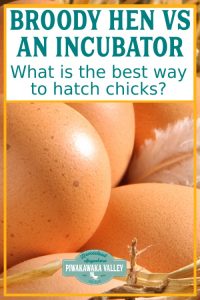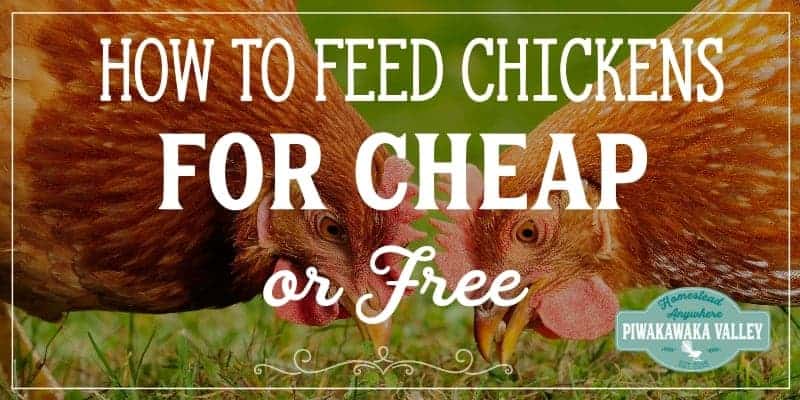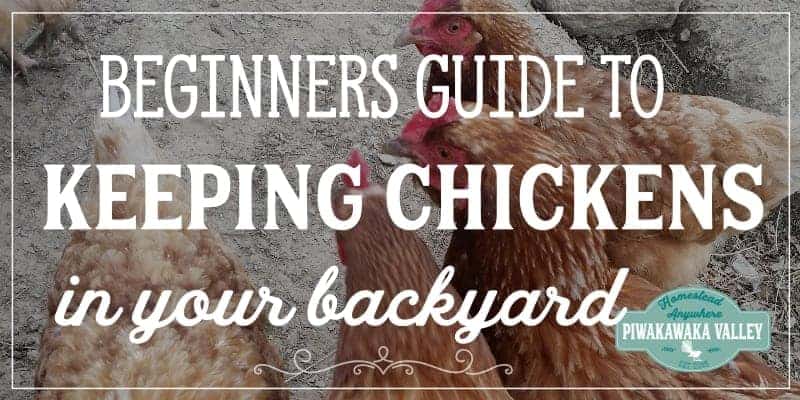This post was most recently updated on August 10th, 2021
Everybody loves the sight of baby chicks! And if you are looking for a sustainable flock, you are probably interested in hatching your own baby chicks. But what is the best way to hatch chicks? Are you better to use a broody hen or an incubator? This article explores the broody hen vs incubator discussion and makes 7 compelling arguments each way.
Please read: This information is provided for educational purposes only and is not intended to treat, diagnose or prevent any disease. We encourage you to make your own health care decisions in partnership with a qualified health care professional.
This post contains affiliate links, this means at no extra cost to you, we make a commission from sales. Please read our Disclosure Statement
A note on hatching eggs
If you want to hatch chickens at home, you will need to source some fertile eggs. You can often buy these online from breeders, or ask around friends and family.
If you have a rooster and hens of your own, you might like to start your own little breeding set up.
Eggs can be saved up and stored in a cool (but not cold) place for 7-10 days before being placed under a broody hen or in an incubator.
Broody Hen vs Incubator – what is the best way to hatch chicks?
There are some distinct benefits to using an incubator or a mother hen to hatch chicks. Here we will explore the benefits and disadvantages of hatching chickens with a broody hen vs incubator. Of course there is a third option, where you buy in day old chicks, and that is by far the easiest choice!
RELATED: How often should you collect eggs?
Hatching Chicks with a Broody Hen
If you have a chicken that has gone broody, she will sit on her nest all puffed up and get really grumpy when you come to try and take her eggs. She will barely leave the nest even to eat or drink.
If she has been like this, with real dedication for several days, without showing signed of giving up, this is the time to sneak some fertile eggs under her. If you cover her head with a towel or do it at night so that it is dark, she is less likely to try and bite you.
What is the best broody chicken?
Some breeds are better at going broody than others, and you can raise any hens eggs under any breed of hen and she will adopt them as her own.
Old heritage breeds like Orpingtons and Light Sussex are better at going broody than the commercial layer hybrids. However, one of our best mother hens was a hybrid laying chicken!
Silkies are known as one of the BEST breeds to keep for raising eggs, they go broody twice per season usually and they make wonderful mothers. They are terrible for egg production as they tend to lay enough eggs for a clutch and then go broody and sit on them.
However their mothering instinct is so strong they will often accept an orphan baby chick even when they didn’t hatch it.
RELATED: 10 Best broody hen breeds
The benefits of incubating eggs with a mother hen
- You can just let nature take its course – mama knows best, and we find we get very very good hatching rates from a broody hen
- No need for fancy set ups – no incubator, no brooder and mama does all the incubation, heating and feeding of the baby chicks
- The hen turns the eggs, ensuring they each spend equal amounts of time on each side and rotate from the center to the edges of the nest for even warming.
- It’s said that broodies can detect non-fertile and non-developing eggs and will kick them out of her nest – no need to even candle the eggs.
- Since the rest of the flock will be used to the chicks being part of the flock right from hatch, they are far more likely to accept them without any trouble.
- A mama hen is a great way for babies to learn how to be real chickens, and she will protect them with her life.
- How cute is it to see a hen out with her babies!?
The downside to incubating eggs with a mother hen
- You have to wait for her to go broody before you source your eggs (you can only store them for up to a week to 10 days before they are too old).
- Mama hens sometimes ‘break their brood’ before the chicks hatch meaning all the eggs are wasted because she has decided to no longer incubate them.
- Not all broodies make good mothers and once the chicks hatch, will sometimes lose interest in caring for them, or worse, maim or kill them, so you should have an indoor brooder box at the ready just in case.
- A baby chicken raised with mama will not be as friendly as hand raised ones.
- Some breeds or individual hens just won’t go broody, a silkie or bantam hen is probably your best bet if you are wanting to hatch eggs under a hen as they are more inclined to go broody and usually make great mothers.
- Broody hens will usually only go broody in the spring and early to mid summer which means you can only hatch in the spring and early to mid summer. If you’d like to hatch year round like I do, the better choice may be the incubator.
- A mama hen can only safely hatch 6-7 eggs for a bantam and 7-10 eggs for a large hen. Too many and some with get cold and you risk loosing the whole clutch.
Is it bad for a hen to be broody?
A brooding hen neglects her own care and will often go without food or water and she can get quite out of shape if she is hatching several clutches a year.
Letting a mother hen hatch one clutch of eggs per year if she chooses to go broody is perfectly healthy as long as she has access to a high nutrient feed and is given eggs to hatch, this will limit how long she sits on her nest to the three weeks it takes for the chicks to hatch.
Leaving a broody hen for weeks on end on no eggs will mean she continues to lose condition – some hens are very stubborn brooders and will stay on the nest for months if left to it.
RELATED: How to break a broody hen
RELATED: How to hatch chicks in 5 steps
Hatching eggs with an incubator
Chicken egg incubators come in a variety of shapes and sizes. We dabbled with a homemade egg incubator but eventually forked out for one of these .
You can get home incubators for as few as 6 eggs and up to several hundred. Of course the price is quite different between the different sizes as well. If you are wanting to hatch bantam eggs or quail eggs, be sure to get one that you can adjust the tray sizes to fit.
If you are looking to buy and incubator, try to get one that automatically changes the temperature, alters the humidity and turns the eggs for you. This will greatly increase your hatch rate success as well as making incubation much easier on you.
Most incubators are set up to handle most types of poultry and some will do almost any bird, depending on the settings required for that species.
The benefits to hatching eggs in an incubator
- You can do it when it suits you
- You can hatch chicks year round
- You can watch the whole process happen in 21 days!
- You don’t need a separate hen house for a broody hen
- You don’t have a hen out of production sitting on a clutch of eggs for 3 weeks and then raising chicks
- You can hatch more eggs at once (depending on the size of your incubator)
- Incubators are readily available and secondhand or homemade ones are quite affordable.
The downside to hatching chicks in an incubator
- There is a lot of room for human error – you need to maintain temperature, humidity and movement accurately over the whole 3 weeks
- If there is a power cut you may lose them all
- You will need a brooder to then raise the chicks in
- Incubators aren’t usually cheap to buy or run
- External temperature fluctuations can be hard for the heater to keep up with (we insulate the top of ours with a folded towel)
- You will need somewhere inside to keep the chicks for 8 weeks, then somewhere safe to get them to a decent size before you introduce them to the rest of the flock.
- Fertile hatching eggs are not guaranteed to actually develop, or even be fertile. The only way to be sure is to incubate them for 10 days and then check embryo development.
Storing Eggs for Hatching
Storing eggs is the same for broody hens and incubators, though you don’t have to store a broody hen’s eggs because she is capable of creating her own nest unless you want her hatching specific eggs.
If she has already gone broody and there are no eggs under her, you will need to add some artificial eggs as once a hen is broody they stop laying, and without eggs to sit on, she might give up on the nest.
For storing, the eggs should be kept around 55 – 65 F / 10-15C. A good place to keep them is in a basement.
Never put them in front of a window, in the sun or anywhere that can get warm.
Eggs should also be tilted daily while in storage to prevent the yolk from sticking to the side of the egg. Simply place a block of wood or a thick book under one side of the carton, and then move it to the other side the following day.
Humidity should be kept around 60-75% during storage. Humidity levels aren’t that important, but it shouldn’t be too dry.
You should also keep in mind that eggs can’t be stored forever. Their hatchability starts to decline after 7 days, though I’ve seen great hatch rates of eggs up to 14 days old. But 7-10 days is the standard maximum age for stored fertile eggs.
Is my hen broody or sick?
A sick hen and a broody hen will act very differently. A sick hen will sulk, with her tail down and often with her eyes half closed. She will usually barely notice if you rummage under her for eggs.
A broody hen will not be impressed that you are in her space. She will be on high alert and aggressive to any prying hands. She will puff up, make warning coos and peck at you.







